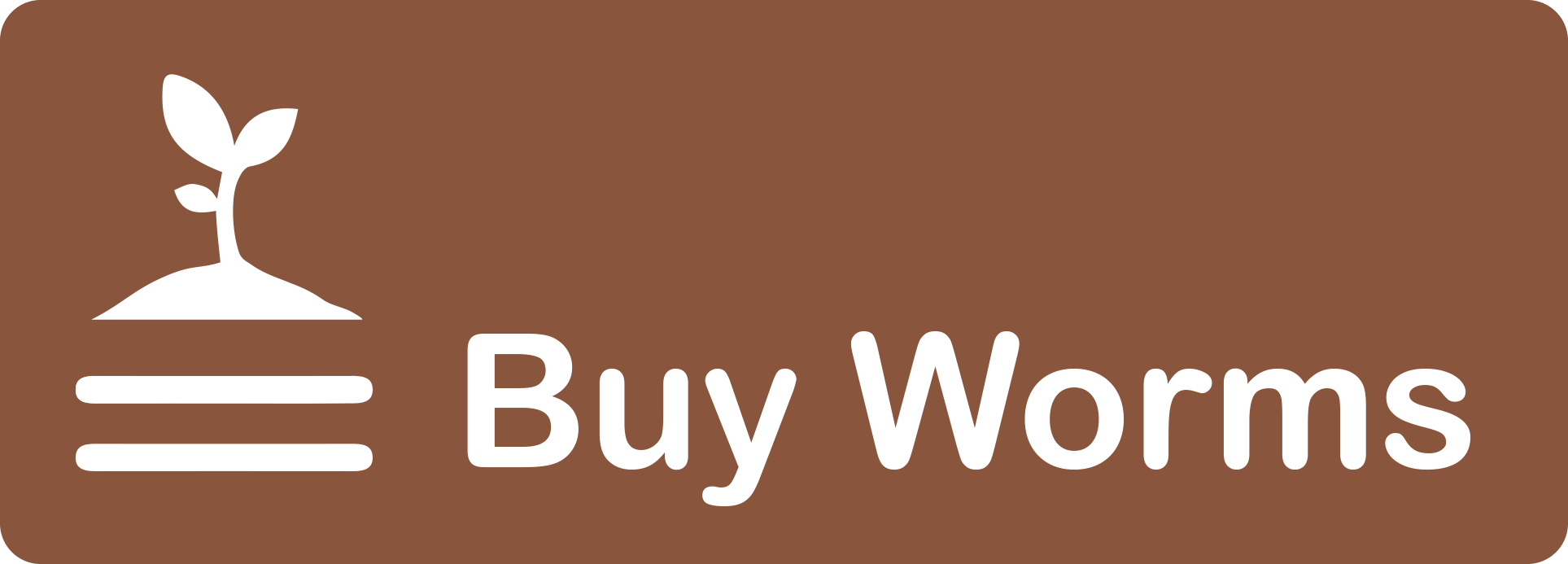Composting is the natural process of breaking down food waste, leaves, and other organic matter into a rich soil amendment. Worm composting (vermicomposting) is when a type of earthworm called a “redworm” eats food waste and other organic matter (plant waste, paper, etc), resulting in a rich compost that can be used as fertilizer for lawns, gardens, and house plants. Letting worms turn your garbage into a nutrient-filled humus is a satisfying experience. It’s the true essence of recycling!
THE BENEFITS OF WORM COMPOSTING
Vermicompost is a rich and valuable soil additive. It’s a mixture of worm castings, organic material, and bedding and is high in plant nutrients such as calcium, iron, potassium, sulfur, and phosphorus. When added to soil, it stimulates plant growth, decreases soil acidity, and helps hold moisture in the soil—all without the harmful effects of chemicals.
Why compost?
- Vermicomposting creates superior, nutrient-rich compost
- It can be done indoors year round.
- Composting saves landfill space.
- It’s an easy way to recycle food waste.
- Vermicompost is environmentally beneficial.
- The process is educational and fun.
To read more about vermicomposting as a sustainable solution for garbage disposal, read Ken Perry’s feature essay in The Natural Farmer magazine.
HOW TO USE VERMICOMPOST
TOP DRESSING
Sprinkle vermicompost around the base of plants and on grass to provide organic matter and additional nutrients. It’s excellent for houseplants, gardens, and lawns.
POTTING MIX
Add 1/3 vermicompost to potting soil when repotting plants indoors or out.
SEEDS AND TRANSPLANTS
Sprinkle vermicompost into seed rows before planting seeds, or place a handful at the bottom of holes dug for transplants.
WORM TEA
Worm tea is a truly incredible fertilizer! It provides needed organic nutrients without ever burning plants. You can make worm tea from vermicompost or collect it directly from your composting bin.
MAKE YOUR OWN WORM TEA!
To make your own worm tea, soak worm castings (vermicompost) in old nylon stockings in a bucket of water for a few days. To collect it directly from your compost bin, simply catch the excess moisture that drains through the bedding in a drain pan under your bin (or collect from the spout, if your bin is so equipped). Dilute with 3 parts water and use it to feed your plants! You’ll be amazed with the results.
REDWORM FAQ
Q: Can I use my redworms for fishing?
A: Yes, red wigglers are great for bait.
Q: Can I have too many worms?
A: No. Redworms breed quickly and you may notice more and more worms as the months go by. If you don’t harvest the worms to give to your friends or for fishing, they will continue to multiply relative to the size of your bin and how much food you feed them.
Q: How do worms reproduce?
A: Every worm can produce and fertilize their own eggs. The swollen white band on the worm’s body will shed and become an egg (cocoon). In approximately 3 weeks, 1-3 baby worms will hatch from this egg.
Q: Can I put my redworms directly in the garden?
A: No. Composting redworms feed on decaying organic matter. They also need a consistently moist environment in order to survive.
Q: Will I need a worm sitter while away on vacation?
A: No—just make sure they have plenty of food and the bin is moist.
TROUBLESHOOTING
Q: Will my worm bin smell?
A: A healthy worm bin should smell like garden soil. A foul odor indicates that something is wrong. Go through the following checklist to prevent or solve odor problems:
- Put plenty of air holes in the bin to ensure that the worms have adequate air to breathe.
- Feed only a vegetarian diet.
- Bury food wastes completely under the bedding.
- Insure adequate drainage for the bin.
- Do not overfeed.
Q: What other creatures will live in the bin?
A: You will find other decomposers living and working in the bin. Most of them, in small quantities, are harmless and actually help the redworms do their work. A few common creatures are:
- Mites: will appear as minute white, gray, or brown slow-moving dots. A few are okay; remove large bunches.
- Enchytraeids: These ¼”+ white, segmented worms are harmless and can be left alone.
Q: What about fruit flies?
A: Fruit flies will be attracted to your bin if the food is not completely buried under the bedding. If they’re present, you can stop feeding the worms for a few weeks or vacuum up the fruit flies when you open the bin.
Q: Will my worms crawl out of the bin?
A: Normally redworms are perfectly happy to stay in their bin. If the food waste is too acidic, they may try to leave. It takes a great deal of citrus fruits to create this problem, so it’s easily avoided by feeding the worms other foods to balance the citrus. Eggshells are especially good for this purpose.



